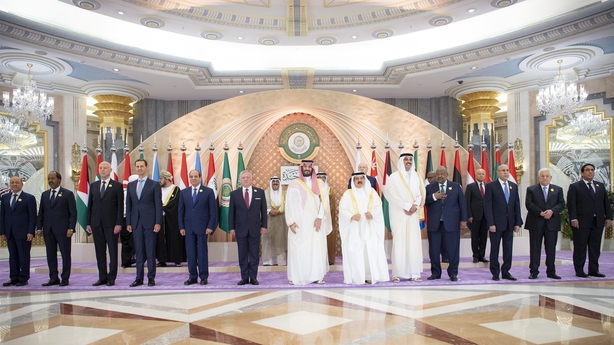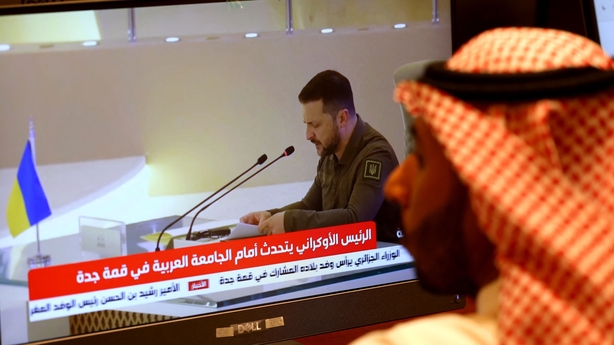Arab leaders have welcomed Syrian President Bashar al-Assad back into the fold at a summit in Saudi Arabia that is also expected to confront conflicts across the Middle East and beyond.
President Assad called for a "new phase" in regional cooperation in his remarks at the summit, which also featured a surprise appearance by Ukrainian President Volodymyr Zelensky, a sign of host Saudi Arabia's growing diplomatic clout.
It was the first time Mr Assad had appeared at the Arab League since Syria was suspended in 2011 over the brutal crackdown on pro-democracy demonstrators that led to civil war.
"I hope that it marks the beginning of a new phase of Arab action for solidarity among us, for peace in our region, development and prosperity instead of war and destruction," Mr Assad told the gathering in the Red Sea coastal city of Jeddah.
As leaders walked into the main hall, he exchanged greetings with Egyptian President Abdel Fattah al-Sisi, and before the opening ceremony he met Tunisia's president and the vice president of the United Arab Emirates.
"I would like to loudly welcome Syria back to its seat among its brothers," Algerian Prime Minister Ayman Benabderrahmane said in the opening speech of the summit.
"We are pleased today by the attendance of Syrian President Bashar al-Assad in this summit," Saudi Crown Prince Mohammed bin Salman, the kingdom's de facto ruler, said in his remarks, adding he hoped the return would lead to "stability" in Syria.
The embrace of President Assad was a marked departure for Saudi Arabia, which backed the Syrian opposition and supported rebel groups during earlier stages of Syria's war and accused Mr Assad, a staunch Iran ally, of operating a "killing machine".

Back home in Syria, hundreds in the rebel-held north protested against his rehabilitation with chants of "the people want the fall of the regime", rallying cry of the protests that rocked Syria and other Arab countries in 2011.
Mr Assad's return follows a frenetic stretch of high-stakes diplomacy triggered by the kingdom's surprise Chinese-brokered rapprochement deal with Iran announced in March.
Since then, Saudi Arabia has restored bilateral ties with Syria and ramped up a push for peace in Yemen, where it leads a military coalition against the Iran-backed Huthi rebels.
In his speech, Mr Assad thanked Prince Mohammed "for the great role he played and the intense efforts he exerted to promote reconciliation in our region".
Not every country in the region has been eager to mend ties with President Assad.
Qatar said this month it would not normalise relations with the Assad government but noted this would not be "an obstacle" to Arab League reintegration.
Syrian state media reported that Mr Assad chatted and shook hands with Qatari emir Sheikh Tamim bin Hamad Al-Thani before entering the summit hall.
The president of another Gulf state, the United Arab Emirates, was a notable no-show, sending his brother and vice president instead.

From Riyadh's perspective, a successful summit would involve concrete commitments from Syria on issues including war refugees and the captagon trade, said Torbjorn Soltvedt of the risk intelligence firm Verisk Maplecroft.
President Zelensky's visit was his first to the Middle East since Moscow's invasion in February 2022, giving the Ukrainian leader an opportunity to address leaders of a region who have been far less united in their support of Kyiv than staunch Western allies.
Dressed in his trademark fatigues, Mr Zelensky was greeted at the airport by Ukraine's ambassador and Saudi officials.
He later accused some Arab leaders of ignoring the horrors of Russia's invasion.
"Unfortunately, there are some in the world and here, among you, who turn a blind eye to those cages and illegal annexations," Mr Zelensky told Arab heads of state, urging them to "take an honest look" at the war.
Syria's pro-government daily Al-Watan said the Syrian delegation did not use the headphones provided for simultaneous translation of Mr Zelensky's summit speech, delivered in English.
An Arab League official said President Zelenky's invitation came from Saudi Arabia, not the bloc.
He said on social media he met with Prince Mohammed. Saudi officials did not immediately respond to requests for comment.
A representative of the Russian embassy was also expected to attend the summit.
Mr Zelensky said his priorities for the visit would be "the presentation of our peace formula whose implementation should involve as many states as possible".
Another priority, he wrote on social media, was "the protection of Ukraine's Muslim community" in the Crimean Peninsula, which was annexed by Russia in 2014.
Saudi Arabia has positioned itself as relatively neutral on the war in Ukraine.
While pledging hundreds of millions of dollars in aid to Ukraine and backing UN Security Council resolutions denouncing Russia's invasion, it has also coordinated closely with Russia on energy policy, earning a rebuke from Washington last year.
Hundreds protested in rebel-held northern Syria on Friday against President Bashar al-Assad's participation in the Arab League summit in Saudi Arabia after a more than decade-long suspension, AFP correspondents said.
"The people want the fall of the regime," chanted demonstrators in Azaz, one of the main slogans from the waves of peaceful protests that broke out in Syria in 2011.
"Syria cannot be represented by Assad the criminal," read a banner at the protest in the town, which is under the control of pro-Turkish groups.
Anti-Assad protests took part in other rebel-held areas, including in the northern city of Afrin where a crowd held up a large flag opposition flag.
More than half a million people have been killed and around half of the country's pre-war population has been forced from their homes due to the conflict.
"We call on the Arab peoples to put pressure on their governments to go back on the decision (to re-admit Syria) and for Bashar al-Assad to leave," said Issam Khatib, a lawyer originally from the northern city of Aleppo.

